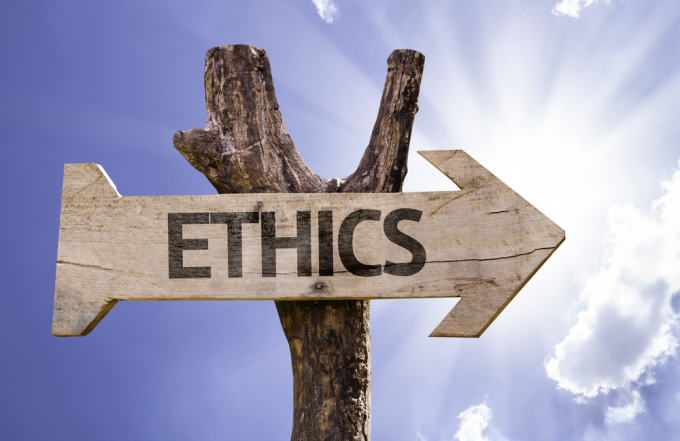
This article previously appeared in the Rochester Business Journal and is republished here with permission.
After an unending parade of corporate scandals, tightening government regulations and zealous prosecutions over the last two decades, it has become fashionable for business executives to publicly tout the virtues of ethical business conduct. The inside covers of corporate codes of business conduct and ethics (now mandated by stock exchange listing rules) are festooned with CEO letters extolling unwavering commitments to “performance with integrity,” adherence to the “highest ethical standards” and the importance of “honesty in everything we do.”
I applaud these aspirations because I believe they promote virtuous behavior that is more likely than its opposite to attract, retain and motivate the best people and promote human flourishing. I am also persuaded by published empirical data that ethical business practices reduce enterprise risks and are generally advantageous to long-term business performance.
However, during my 20 years in the law and compliance departments of four multinational corporations, I have encountered hundreds of situations in which adhering to “the highest ethical standards” would have failed to yield an optimal business outcome. I have also seen firms reap profits and pay no penalties when ideals were cast aside, rationalized away or forgotten altogether to avoid the adverse impacts of complying with legal and ethical standards.
This dichotomy between espoused ideals and business realities causes me to seek an honest answer to the following questions: Does it really make good business sense to always operate in accordance with the highest ethical standards? Don’t business professionals need a bit of moral elbow room to do their work in a responsible way? Should business professionals really aspire to wear an ethical straitjacket, regardless of the consequences to themselves or their firm?
To be clear, I’m not asking these questions with respect to circumstances in which business professionals seek a principled resolution of right-versus-right conflicts. Instead, I’m interested in those occasions when a choice must be made between right and wrong and there is a reasonable risk-adjusted return for pursuing an illegal or unethical course. In those circumstances, isn’t it wiser to be a “sensible knave” than a saint?
For those unfamiliar with the concept, the sensible knave is an invention of the Scottish philosopher David Hume, who famously wrote: “That honesty is the best policy, may be a good general rule, but is liable to many exceptions; and he, it may perhaps be thought, conducts himself with most wisdom, who observes the general rule, and takes advantage of all the exceptions.”
We all know sensible knaves, and occasionally we may have played the part ourselves. Their ubiquity may evidence that the sensible knave philosophy is the actual, if not overtly espoused, utilitarian credo of a significant fraction of business professionals—and for good reason. If such a strategy could be consistently pursued, it might very well be one that optimizes business performance. This, of course, is what makes sensible knavery in business so seductive. It’s an approach that provides the moral flexibility to win, even when we may be playing a losing hand.
So why not abandon the Pollyannaish notion of conducting business in accordance with the highest ethical standards and instead embrace a sensible knave strategy in advancing one’s career and fulfilling one’s fiduciary responsibilities to shareholders? After all, one might argue, the ethical approach may work well in some utopian world, but it’s ill-suited for conducting business in the imperfect world in which we actually ply our trades. Further, one might observe that anyone seriously advocating that businesses routinely forgo profitable opportunities out of a quixotic zeal to be good is impossibly naive and probably not cut out for the rough-and-tumble of the marketplace.
As pragmatic and persuasive as these observations may be, consider the following three arguments against a life of knavery before tossing your moral aspirations aside.
First, you may be smart enough and disciplined enough to pursue and profit from a sensible knave strategy on occasion, but you’ve got to be uncommonly clever and disciplined to do so throughout your entire career without detection. Most people are likely to fail at this endeavor, regardless of how careful they might be to hide their tracks. And those who do fail could pay a heavy price indeed if they are exposed as the dishonest, and possibly felonious, knaves they are.
Second, psychologists like Philip Zimbardo have observed that even small, deliberate steps outside the lines are likely to lead to greater transgressions over time. This appears to be a path well-trodden by many of our best and brightest business colleagues, who continue to produce headlines that bring disgrace to the business community. Their stories should serve as a cautionary tale to those of us tempted to follow in their footsteps.
Third, and perhaps most importantly, your decision about whether to strive for consistent adherence to ethical principles or to abandon them for expedience is not just a choice between two different business strategies; it’s a choice about your identity. As Kurt Vonnegut said in “Mother Night,” “We are what we pretend to be, so we must be careful about what we pretend to be.” In the end, even if you think you are smart enough to disguise your knavish behavior as business savvy and have the strength of character to avoid the trap Zimbardo describes, a sensible knave is still a knave. This means—and let’s not sugarcoat this—you will actually be a deceitful, wretched malefactor.
Even the best of us fail to live up to our ideals at all times. We occasionally succumb to pressures to compromise our ethiReprinted
with permission of the Rochester Business Journal.
cal standards to get out of a jam or advance our professional goals. But I think there is a world of difference between those of us who strive to chart an ethical course and occasionally fail and those who deliberately employ knavish business practices as a matter of course. The choice we make, both individually and collectively, may be the most consequential decision we ever make, because it will define our character as well as the character of the world in which we live.
Related content:
Is Classical Moral Philosophy Letting Us Down?
The Important Distinction Between Ethics and Compliance
Curing Ethical Blindness
Advising Clients to Pursue an Honorable Course
Blood on the Tracks and the Challenges of Moral Discernment
115
inShare
ABOUT THE AUTHOR
Jim Nortz
jim-nortz-bausch-and-lombJim Nortz is a nationally recognized expert and thought leader in the field of business ethics and compliance.
Jim spent the first 17 years of his career as a litigator trying both criminal and civil cases before becoming Crompton Corporation’s first Vice President, Business Ethics and Compliance in 2003.
Since then, Jim has served as a compliance officer at Crompton and for four other multinational corporations and is now Corporate Compliance Director at Sutherland Global Services.
Mr. Nortz is a frequent guest lecturer at the University of Rochester’s Simon School of Business, RIT’s Saunders School of Business, St. John Fisher College and Nazareth College.
Jim writes the monthly business ethics columns for the Association of Corporate Counsel Docket magazine and the Rochester Business Journal and is a contributing writer for Corporate Compliance Insights and The Business Journals.
Jim served on the Board of Directors for the Ethics and Compliance Officers Association (“ECOA”) for eight years. He currently serves on the Board of the Rochester Area Business Ethics Foundation and is a member of the Rochester chapter of Conscious Capitalism.
Published by Conselium Executive Search, the global leader in compliance search.


